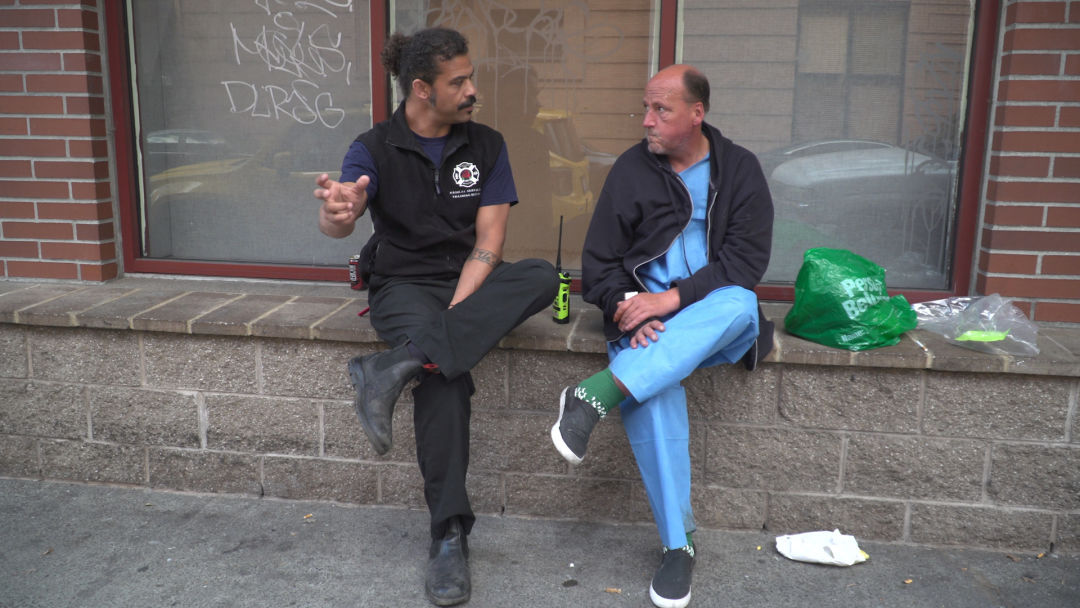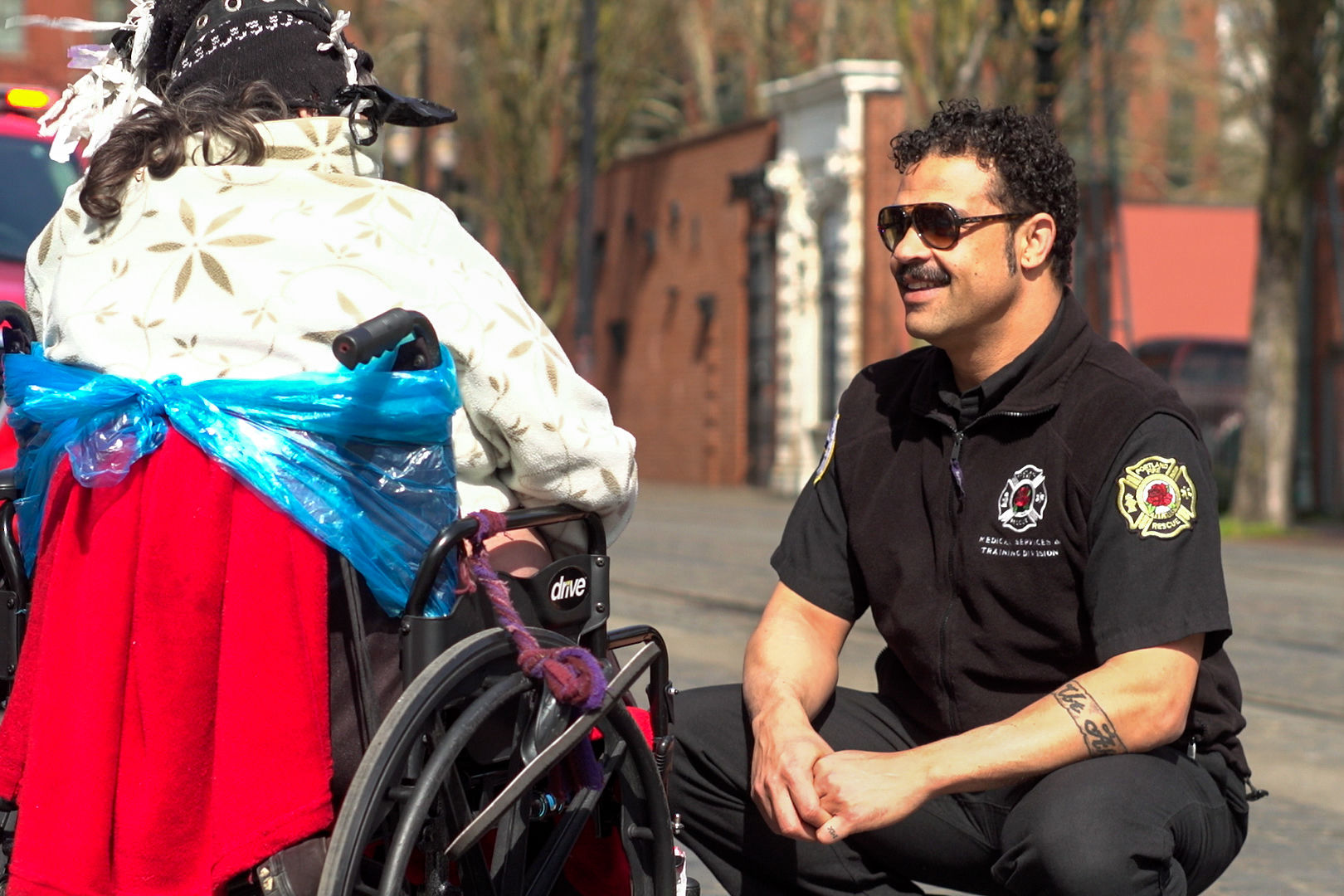Portland Street Response Gets an A on Its Report Card

Tremain Clayton of Portland Street Response talks with a Portlander
Editor's Note: This story has been updated to include comment from Tuesday's city council work session.
Back in May, Mayor Ted Wheeler, Commissioner Dan Ryan, and Commissioner Mingus Mapps all voted against expanding Portland Street Response citywide because they wanted more proof the program was achieving its goals.
But with new data from Portland State University’s Homelessness Research & Action Collaborative on the program’s effectiveness, the city council now looks poised to approve some level of its expansion.
“For the record, I was one of those doubters,” said Commissioner Dan Ryan in a city council work session on Tuesday. “We have to legitimize this program. So, I’m all in now.”
Since February, in the outer Southeast neighborhood of Lents, Portland Street Response has been an alternative to police dispatches for 911 calls involving vulnerable members of the community, including houseless people and those in mental health distress.
The program is one of a handful of meaningful changes made to Portland’s justice system in the wake of 100 days of racial equity protests in 2020 and a years-long housing crisis. On Tuesday, Portland State University’s Homelessness Research & Action Collaborative released a report examining the effectiveness of PSR and recommending next steps for a citywide expansion.
“Based on our findings, we believe Portland Street Response is well on its way to becoming a citywide solution to responding to 911 and non-emergency calls involving unhoused people and people experiencing a mental health crisis,” wrote Greg Townley, director of research at PSU’s Homelessness Research & Action Collaborative and the report’s lead evaluator.
Portland Street Response’s mission is to reduce the overall number of calls going to the police, especially calls related to behavioral health and houselessness. PSU’s report shows that PSR is doing just that, with a 4.6 percent reduction in total calls going to the police.
The report also indicated that 67 percent of PSR contacts involved someone experiencing homelessness, and nearly 53 percent of those contacts involved someone with suspected mental health needs. As a result, the report found that there was a 22.5 percent reduction in police response to calls that typically involve members of Portland’s houseless population—things like non-emergency welfare checks and “unwanted persons” calls.
Researchers also reached out to members of the housed and unhoused communities in Lents to see how people felt about PSR.
On a scale of 1-5, PSR clients all rated the program a 5, with other community members reporting similarly high levels of approval. “They were friendly, treated me like a human being,” said one houseless respondent. “My friend lived because of them,” commented another.
Right now, PSR only operates in Lents, Monday through Friday from 10 a.m. to 6 p.m. PSU’s report recommends a swift expansion of PSR’s reach and availability throughout the day. The report also encourages the city to broaden the criteria for what kinds of calls PSR can answer, including calls from inside residencies and calls involving suicide.
Broadening those criteria may not be so simple though. It all depends on labor negotiations between PSR, the Portland Police Association, and the Portland Fire Fighters Association, which won’t open back up again until February 2022.
Back in May, Commissioner Jo Ann Hardesty proposed a citywide expansion of PSR, only to be shot down by Wheeler, Ryan, and Mapps. Now with the fall budget process looming, Hardesty is once again proposing an expansion of the program.
The budget submission from Portland Fire & Rescue, one of Hardesty’s bureaus that also supports PSR, requests more than $1 million for PSR, although it’s a far cry from the $3.6 million that Hardesty requested in the spring.
Hardesty’s proposal would fund 13 new full-time positions and seven vehicles for the program. It would also allow PSR to operate seven days a week from 8 a.m. to 6 p.m. Monday through Thursday, and from 6 p.m. to 3 a.m. Thursday through Sunday.
In Tuesday’s city council work session, Hardesty confirmed that her office is collaborating with Director of Strategic Innovations Sam Adams in the mayor’s office on securing long-term funding for Portland Street Response. Around $4 million has already been set aside for the expansion of the program, which Wheeler says Portlanders can expect to be included in his fall budget.
Until then, a second PSR team including a firefighter, a mental health worker, and a peer support specialist will begin training next Monday. They will still operate in the Lents neighborhood but will work evenings and early mornings.
One lingering question has to do with PSR’s dispatch system, which goes through 911 calls. PSU found that 46.3 percent of the general community and 57.9 percent of the houseless community interviewed said they didn’t feel comfortable calling 911. That number is even higher for BIPOC individuals. And as more and more Portlanders face long 911 call waits, a more streamlined dispatch process might be in order.
Additionally, PSU’s report recommends the city increase community outreach and education about PSR. Only 25.8 percent of houseless people surveyed said they had heard of the program, while less than half (47.5 percent) of the general community knew of PSR. Again, this number was disproportionately lower for both housed and unhoused BIPOC individuals.
PSR is working on establishing community partnerships and canvassing door-to-door to get the word out. But they’re willing to get creative with their outreach efforts too. “Comics and graphic novels can be used for health literacy. I’d love to work with BIPOC artists to educate the public about the Portland Street Response process,” says Townley.
Portland city council will hear and adopt the revised fall budget, including potential funding for a Portland Street Response expansion, on October 28.




